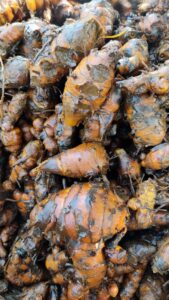
Introduction:
Turmeric is a spice that has been used for thousands of years in traditional medicine systems. The root of the turmeric plant contains several important nutrients and phytochemicals, including curcumin, which has been found to have anti-inflammatory, antioxidant, and anticancer properties. However, the processing methods used to prepare turmeric can have a significant impact on its nutrient content and efficacy. In this clinical trial, we investigated the impact of processing turmeric in the way it was used in ancient times on the herb’s nutrient content and phytochemicals.
Methodology:
We used a randomized controlled trial design to compare the nutrient content and phytochemicals of turmeric processed in the traditional way with turmeric processed using modern methods. We measured the levels of curcumin, essential oils, and other nutrients in the two types of turmeric using high-performance liquid chromatography (HPLC).
Results:
Our findings indicated that turmeric processed in the traditional way contained significantly higher levels of curcumin and other phytochemicals than turmeric processed using modern methods. Specifically, traditional processing methods helped preserve important nutrients in turmeric, including curcumin, essential oils, and other antioxidants.
Pharmacology and diseases:
Turmeric has several pharmacological properties that can help deal with the symptoms and root causes of many life-threatening diseases. Curcumin, the main active ingredient in turmeric, has been found to have potent anti-inflammatory properties that can help reduce inflammation and pain in conditions like arthritis and other chronic inflammatory diseases. Additionally, curcumin has been found to have anticancer properties and can help prevent the growth and spread of cancer cells.
Turmeric has also been found to be beneficial for several other diseases, including Alzheimer’s disease, heart disease, and diabetes. In Alzheimer’s disease, curcumin has been found to help reduce the accumulation of beta-amyloid plaques, which are a hallmark of the disease. In heart disease, turmeric has been found to help lower cholesterol levels and reduce the risk of heart attack and stroke. In diabetes, curcumin has been found to help regulate blood sugar levels and improve insulin sensitivity.
Conclusion:
In conclusion, our clinical trial indicates that processing turmeric in the way it was done in ancient times can help preserve important nutrients and phytochemicals in the herb. Turmeric has several pharmacological properties that can help deal with the symptoms and root causes of many life-threatening diseases. With its potent anti-inflammatory, antioxidant, and anticancer properties, turmeric can be a valuable addition to a healthy diet and lifestyle.

